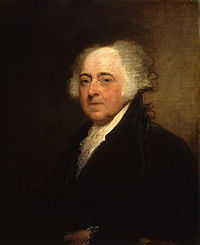 In the election of 1800, a good human being (a flawed person, as are we all) won; a good human being (also flawed) was savaged and lost. Both Federalists and Jeffersonians feared that the other party would destroy American democracy. But our democracy has survived.
In the election of 1800, a good human being (a flawed person, as are we all) won; a good human being (also flawed) was savaged and lost. Both Federalists and Jeffersonians feared that the other party would destroy American democracy. But our democracy has survived.
In the election of 2012, a good human being has won; a good human being has lost. But can the two parties now work together on the issues we confront as a nation?
If John Adams, a man who thought deeply about democratic governance, were alive today he might offer some good advice to our recently elected officials (all of them, Democrats and Republicans alike).
He would breathe a sigh of relief that electioneering politics was finally over; he would welcome the time to govern. He was very critical of electioneering with its emphasis on emotional appeals over logical reasoning. In July, 1774, he wrote Abigail:
These Bickerings of opposite Parties, and their mutual Reproaches, their Declamations, their Sing Song, their Triumphs and Defyances, their Dismals, and Prophecies, are all Delusion.
We Very seldom hear any solid Reasoning. I wish always to discuss the Question, without all Painting, Pathos, Rhetoric, or Flourish of every Kind.
While Adams understood that human beings are swayed both by the heart and the head, he argued that decisions on the important issues facing the country should be based on evidence, not emotion, on the common good, not partisan advantage. As President, he saw himself as a mediator, above party. He would not appreciate the partisan gridlock of the past four years; he did not understand the power of partisan fear that the other party would destroy the country, even though that was a major reason he lost his reelection bid. For Adams the good of the nation was much more important than party spirit.
The election is over; the people have spoken. Now, as our nation faces serious challenges, can Republicans and Democrats work together for the common good, in the spirit of John Adams? The early indications on that count are positive. Leaders of both parties have made encouraging statements.
However, both sides must be willing to compromise. One example: taxation. When major business executives argue for a budget deal even if it raises their taxes, Republicans should listen. They should also remember that Thomas Jefferson advocated progressive taxes, as did the father of capitalism, Adam Smith. John Adams wrote, during the revolutionary war, of his agreement with taxes that were “heaviest upon the rich and the higher Classes of People.” On the other hand, Democrats should listen to Republican fears of taxes killing the goose that lays the golden egg.
Negotiations on avoiding the fiscal cliff will give citizens of the United States an early indication whether Democrats and Republicans will lay aside election politics to work for the common good. In addition to funding the federal government, dealing with a struggling economy, reining in the costs of health care, and strengthening our educational system, global warming and foreign relations will offer ample opportunities for cooperation.
While John Adams abhorred party politics, we know that nonpartisanship is impossible. But Adams (and the founders as a whole) expected officials to govern for the good of all, for the public good. Our country does best resolving serious issues (and our government certainly faces many) with a bipartisan approach. The public good surely requires no less.


